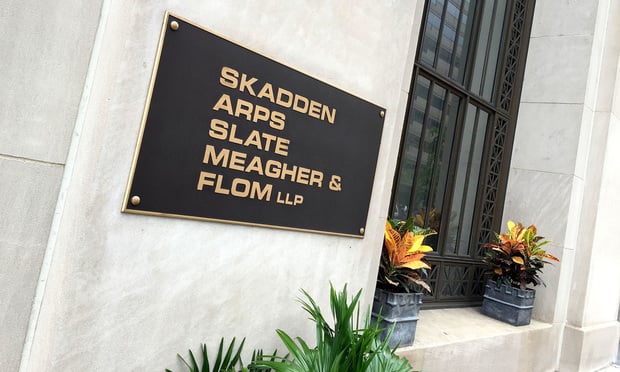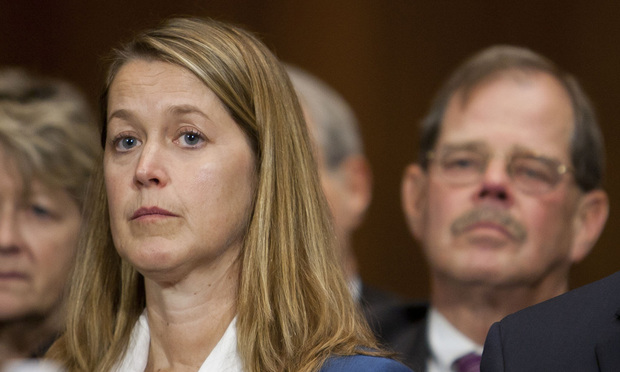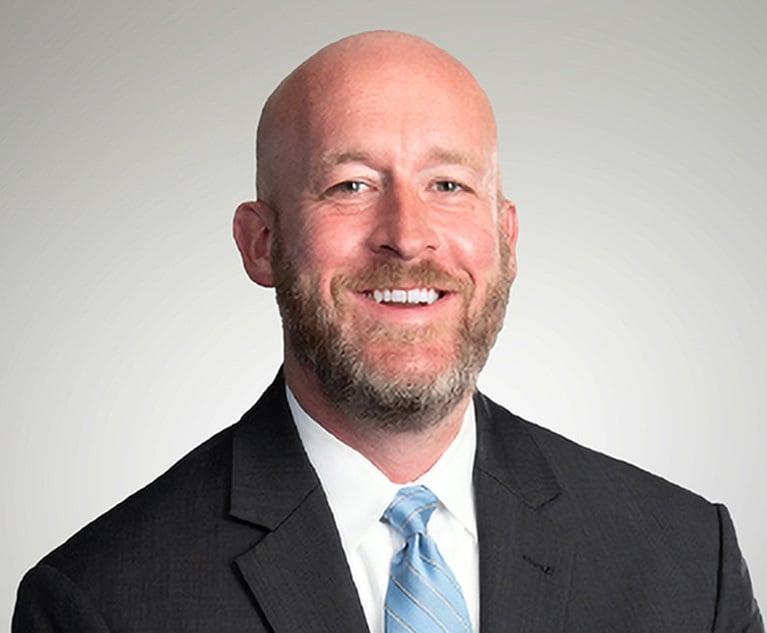What Greg Craig and Prosecutors Don't Want Talked About at Trial
The government is resisting the former Skadden partner's move to call Arnold & Porter's Amy Jeffress as a defense expert witness.
June 25, 2019 at 04:12 PM
7 minute read
The original version of this story was published on National Law Journal
 Skadden, Arps, Slate, Meagher & Flom Washington, D.C., offices. June 19, 2015. Photo: Diego M. Radzinschi/NLJ.
Skadden, Arps, Slate, Meagher & Flom Washington, D.C., offices. June 19, 2015. Photo: Diego M. Radzinschi/NLJ.
Federal prosecutors and defense lawyers for Greg Craig clashed in court this week as the two sides seek to shape the contours of his approaching trial, where the former Obama White House counsel intends to contest charges he misled the U.S. Justice Department about his work for Ukraine as a prominent partner at the firm Skadden, Arps, Slate, Meagher & Flom.
In court filings, Craig's defense team at Zuckerman Spaeder have pushed to exclude evidence they argue is irrelevant to charges that he deceived the Justice Department in 2013 as it scrutinized whether he should register as a foreign agent for his work for Ukraine.
The charges against Craig are tied to his communication with the Justice Department unit tasked with enforcing the Foreign Agents Registration Act, a more than 80-year-old law requiring advocates working for foreign governments or other overseas interests to disclose their activities in the U.S. Hundreds of pages of new records released this week offered a glimpse inside the firm, and at how both sides are approaching the case.
Among the pieces of evidence Craig's defense lawyers want to shut out from the August trial are statements he made in an interview with Special Counsel Robert Mueller III's office in 2017, along with details about how Skadden was be paid for its work on a purportedly independent report on the Ukrainian government's prosecution of Yulia Tymoshenko, a former prime minister and political rival of the country's president at the time, Viktor Yanukovych.
Craig's defense lawyers said his statements to Mueller's team in 2017 “have no legitimate place in a prosecution about alleged concealment of material facts from the FARA Unit in 2013.” Prosecutors have claimed that, in the 2017 interview, Craig repeated “false and misleading statements” he'd previously made to the Justice Department's FARA unit about his role in the public rollout of the report on Tymoshenko's prosecution.
Craig, who retired last year amid scrutiny over his Ukraine work, has consistently denied that he misled the Justice Department. His defense team, led by Zuckerman Spaeder partner William Taylor, repeated Monday Craig's insistence he was truthful with the FARA unit in 2013 and again with the special counsel's office in 2017.
[falcon-embed src="embed_1"]
“If the government persists in its effort to try an uncharged false statement case in addition to the case actually charged, there will be significant factual disputes about the 2017 statements. Those disputes will confuse the jury, waste time, and unfairly prejudice Mr. Craig,” Craig's attorneys said in court papers.
In a separate filing, also filed Monday, Craig's defense lawyers pushed to shut out evidence about what they described as the “byzantine process” in which the Russia-backed government of Ukraine approved a payment to Skadden. A prominent Ukrainian businessman, the steel magnate Victor Pinchuk, had confidentially bankrolled the law firm's work on the Tymoshenko report, paying about $4.15 million in fees and expenses. When Skadden requested more money to complete the report, the Ukrainian government's Ministry of Justice paid an additional $500,000, according to Craig's filing.
Craig's defense lawyers said they had no objection to prosecutors raising at trial the amount Skadden was paid, along with how the fees and expenses were split between Pinchuk and the Ukrainian government. But they said prosecutors should not be allowed to present the “voluminous correspondence” related to the Ukrainian government's portion of payments, which the defense lawyers said would invite “a separate mini-trial on issues related to those fees.”
“Such a diversion will confuse the issues and mislead the jury, and create a significant and undue waste of time and unfair prejudice,” Craig's defense team argued.
Prosecutors have alleged that Craig misled the Justice Department, in part, to avoid the stigma of registering as a foreign agent. But Craig has been charged only with making false and misleading statements, not with violating the Foreign Agents Registration Act.
In one of Monday's filings, Craig's defense lawyers raised concern that the longtime head of the Justice Department's FARA unit, Heather Hunt, would address whether Craig should have registered as a foreign agent. Any such testimony would mislead the jury, Craig's defense team said.
“Ms. Hunt cannot testify that Mr. Craig was required to register under FARA; that is a legal conclusion that no witness, fact or expert, may address at trial,” Craig's lawyers wrote.
Prosecutors, meanwhile, have made moves to limit what Craig's defense lawyers can tell jurors. And they raised similar concerns about the trial focusing on whether Craig violated FARA rather than the actual charges.
 Amy Jeffress (File: 2013) Photo: Diego M. Radzinschi/NLJ
Amy Jeffress (File: 2013) Photo: Diego M. Radzinschi/NLJIn a filing Monday, prosecutors said Craig should not be allowed to call Arnold & Porter Kaye Scholer partner Amy Jeffress as an expert witness in his defense.
Jeffress, a former federal prosecutor who counsels clients on FARA, was named this month as an expert witness who would “opine that it would have been reasonable for a knowledgeable practitioner in the field in or around 2012 and 2013″ to believe there was no need to register as a foreign agent in connection with the type of report Craig prepared for Ukraine, “regardless of how the foreign entity intended to use the report or did in fact use it.”
Prosecutors contend Jeffress' opinion has “no bearing on whether [Craig] made false statements and omitted material facts in 2013 when the FARA Unit inquired about his activities.”
“Admitting Ms. Jeffress' opinion on that matter risks confusing the jury about the issue it will be charged to decide—whether [Craig] made false statements and omissions—and misleading it into believing it must decide whether he had a registration obligation; indeed, Ms. Jeffress' testimony risks turning the case into a mini-trial on FARA registration obligations.”
Out of an “abundance of caution,” prosecutors also argued that Craig's defense team should be barred from suggesting that the charges against him reflect a selective enforcement of FARA. That restriction, prosecutors said, should exclude “evidence or arguments” related to the investigation of Craig conducted by the U.S. attorney's office in Manhattan.
Craig's defense lawyers have said he was charged in Washington only after the U.S. Attorney's Office for the Southern District of New York declined to bring a case.
Prosecutors said it was unclear whether Craig planned to make that defense at trial but said his defense lawyers, in a June 20 email, accused the Justice Department of an “outrageous abuse of prosecutorial discretion.”
Read more:
Arnold & Porter's Amy Jeffress Will Be Defense Witness for Gregory Craig
Cliff Sloan, Longtime Skadden Partner, Leaves Firm for Georgetown Law
Craig Says Nothing 'Tawdry' About Helping Manafort's Daughter Get Skadden Job
Greg Craig's Lawyers Bash 'Vague, Cryptic and Confusing' Charges
Skadden's Foreign-Lobbying Settlement Is Off-Limits at Greg Craig's Trial
This content has been archived. It is available through our partners, LexisNexis® and Bloomberg Law.
To view this content, please continue to their sites.
Not a Lexis Subscriber?
Subscribe Now
Not a Bloomberg Law Subscriber?
Subscribe Now
NOT FOR REPRINT
© 2025 ALM Global, LLC, All Rights Reserved. Request academic re-use from www.copyright.com. All other uses, submit a request to [email protected]. For more information visit Asset & Logo Licensing.
You Might Like
View All
Beyond Borders: Baker McKenzie Attorneys Stress the Need for a Global Outlook Cybersecurity and Data Privacy Matters

Snell & Wilmer's Andrew Young and the Case of the FBI's Secret Encrypted Phone Company

How One of the World's Largest Institutional Investors Approaches Litigation

Trick or Treat? How an Office Halloween Party Convo Led to a Quinn Associate's Appellate Argument
Trending Stories
- 1‘The Decision Will Help Others’: NJ Supreme Court Reverses Appellate Div. in OPRA Claim Over Body-Worn Camera Footage
- 2MoFo Associate Sees a Familiar Face During Her First Appellate Argument: Justice Breyer
- 3Antitrust in Trump 2.0: Expect Gap Filling from State Attorneys General
- 4People in the News—Jan. 22, 2025—Knox McLaughlin, Saxton & Stump
- 5How I Made Office Managing Partner: 'Be Open to Opportunities, Ready to Seize Them When They Arise,' Says Lara Shortz of Michelman & Robinson
Who Got The Work
J. Brugh Lower of Gibbons has entered an appearance for industrial equipment supplier Devco Corporation in a pending trademark infringement lawsuit. The suit, accusing the defendant of selling knock-off Graco products, was filed Dec. 18 in New Jersey District Court by Rivkin Radler on behalf of Graco Inc. and Graco Minnesota. The case, assigned to U.S. District Judge Zahid N. Quraishi, is 3:24-cv-11294, Graco Inc. et al v. Devco Corporation.
Who Got The Work
Rebecca Maller-Stein and Kent A. Yalowitz of Arnold & Porter Kaye Scholer have entered their appearances for Hanaco Venture Capital and its executives, Lior Prosor and David Frankel, in a pending securities lawsuit. The action, filed on Dec. 24 in New York Southern District Court by Zell, Aron & Co. on behalf of Goldeneye Advisors, accuses the defendants of negligently and fraudulently managing the plaintiff's $1 million investment. The case, assigned to U.S. District Judge Vernon S. Broderick, is 1:24-cv-09918, Goldeneye Advisors, LLC v. Hanaco Venture Capital, Ltd. et al.
Who Got The Work
Attorneys from A&O Shearman has stepped in as defense counsel for Toronto-Dominion Bank and other defendants in a pending securities class action. The suit, filed Dec. 11 in New York Southern District Court by Bleichmar Fonti & Auld, accuses the defendants of concealing the bank's 'pervasive' deficiencies in regards to its compliance with the Bank Secrecy Act and the quality of its anti-money laundering controls. The case, assigned to U.S. District Judge Arun Subramanian, is 1:24-cv-09445, Gonzalez v. The Toronto-Dominion Bank et al.
Who Got The Work
Crown Castle International, a Pennsylvania company providing shared communications infrastructure, has turned to Luke D. Wolf of Gordon Rees Scully Mansukhani to fend off a pending breach-of-contract lawsuit. The court action, filed Nov. 25 in Michigan Eastern District Court by Hooper Hathaway PC on behalf of The Town Residences LLC, accuses Crown Castle of failing to transfer approximately $30,000 in utility payments from T-Mobile in breach of a roof-top lease and assignment agreement. The case, assigned to U.S. District Judge Susan K. Declercq, is 2:24-cv-13131, The Town Residences LLC v. T-Mobile US, Inc. et al.
Who Got The Work
Wilfred P. Coronato and Daniel M. Schwartz of McCarter & English have stepped in as defense counsel to Electrolux Home Products Inc. in a pending product liability lawsuit. The court action, filed Nov. 26 in New York Eastern District Court by Poulos Lopiccolo PC and Nagel Rice LLP on behalf of David Stern, alleges that the defendant's refrigerators’ drawers and shelving repeatedly break and fall apart within months after purchase. The case, assigned to U.S. District Judge Joan M. Azrack, is 2:24-cv-08204, Stern v. Electrolux Home Products, Inc.
Featured Firms
Law Offices of Gary Martin Hays & Associates, P.C.
(470) 294-1674
Law Offices of Mark E. Salomone
(857) 444-6468
Smith & Hassler
(713) 739-1250






